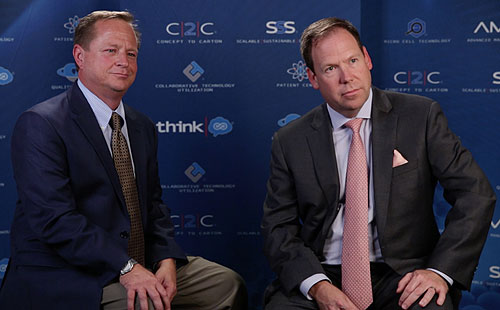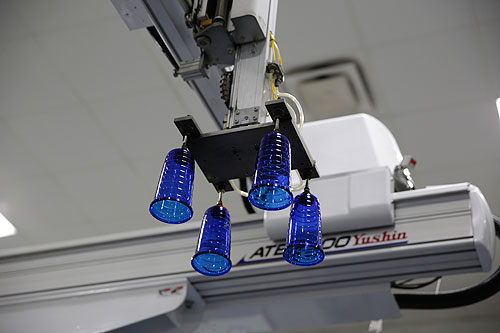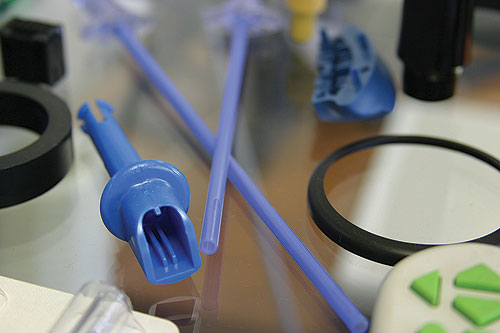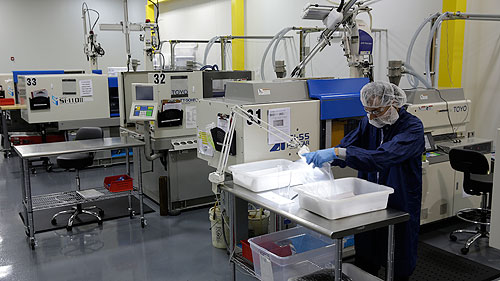More than Molding: OCTEX Aims for Magic
by Dianna Brodine
Plastics Business

Since 2008, OCTEX has increased its revenue by over 150 percent and has invested more than $10 million in its facilities and technologies, with more to come.
Twenty-five years after it first opened its doors in Sarasota, Florida, OCTEX LLC is shaping a future that is cutting edge in every sense. With a unique talent acquisition strategy, nearly unrestricted technology investments and an aggressive campus development plan, the company strives to be more to its customers than an injection molding provider.
Led by a desire to make a difference
Producing parts for the medical, consumer, defense and aerospace, industrial and automotive markets, OCTEX manufactures volumes ranging from one conceptual part to more than 100 million parts per year. With injection molded products as varied as industrial diesel filters and implantable surgical device components, the company's bread and butter is in small parts, with weights from 0.0008 grams to three pounds.
"At OCTEX, we produce parts, subassemblies, full assemblies and complete devices, depending on the partner and market," said John Hoskins, executive vice president. "In doing so, many secondary processes, such as automated assembly, testing, marking (laser and print), labeling and automated inspection, are performed on a regular basis. Over half of the products we produce have secondary processes."
The entrenchment from product development through final product testing is intentional, and the company labels it "Concept to Carton," describing a 40-90 percent reduction in tool build time and a 45-75 percent reduction in tool cost, which also typically results in a 60 percent reduction in time to market. "A constant among all the markets we serve is the need to bring ideas to market faster and more cost effectively," Hoskins explained. "Our commitment to our partners begins the moment they present an idea, and it never ends because we support it throughout the product life cycle."
Concept to Carton only is one of the outcomes that resulted from a leadership team assembled with an eye on creating a different approach to manufacturing. Founded in 1990, the company was purchased in 2009 by Jim Westman, an investment banker with a strong desire to be part of the reinvigoration of US manufacturing. "His mergers and acquisitions experience gave him familiarity with best practices across all industries," said Hoskins, "but manufacturing wasn't his background."
Neither is manufacturing the background for many of the employees. Westman brought in experts in every market and every field, from consumer, aerospace and medical to those with PhDs in polymers and material sciences, as well as staff with technical expertise. "We didn't focus on those working in injection molding – we went to the areas of study behind the molding," Hoskins explained. "We want to understand plastics in its essence before we try to mold it. There's an art to what plastics is, and then there's a huge amount of science. Those two elements must be merged, and that's what we're doing with our team."
With Westman at the helm and a team in place, the company leadership stepped back to evaluate its current strengths, its future direction and the steps that needed to be taken to achieve it. What developed was the driving principles of OCTEX: engage-innovate-evolve. "We looked at the company and saw a beautifully run organization that was itching to do something more," explained Hoskins. "OCTEX already was efficient, lean and well-run, but we needed a focus to show us where we were going and a robust culture to get us there."
The evaluation process took into account the potential in several markets, but a desire to touch people's lives directed the focus toward the medical and consumer industries. "We had to talk about how we wanted to spend our next 50 years – how we wanted to be remembered," Hoskins said. "We needed to harness the amazing power of the team and create a culture that allows this incredible group of people to be the best they can be. It's important to come into work and learn something every day that could have a profound impact, so we built a culture that promotes that and found a marketplace that welcomes us."
The white board approach
When Hoskins talks about OCTEX, his excitement and enthusiasm ring through loud and clear. This is not a company content with its achievements – the entire company wants more. And, "more" starts the moment its employees and customers walk through the door.
The facility was constructed to create a feeling of openness and airiness, from the main hall to the production floor, which Hoskins described as "light, clean and beautiful. It's efficient and quiet." The effect is designed to mimic a giant white room or scientific laboratory. "We're not typical, because we don't see ourselves as an injection molder," he explained. "It's one of our core competencies, but we're a solutions partner. Nothing we do is normal, and that's why we're so successful."
OCTEX encourages its staff to take a white board approach each and every day, positing a belief that there are no failures or problems, but simply opportunities for the growth of knowledge. A 30-foot billboard proclaims, "This is where imagination goes to work," and that attitude is encouraged in every aspect of the culture. "We want our employees to experiment, so we encourage R&D work. Our quality labs contain a million dollars of advanced machinery so we can analyze each part to figure out how we can make it better. We're constantly trying to understand the materials and processes, because to make great parts, you have to be able to see and understand them," Hoskins said.
To encourage idea creation, traditional barriers have been removed. In meetings, staff from departments as varied as sales, metrology and engineering work together to understand the client's objectives. Then, the team works to improve upon the product that can meet those objectives. The freedom to pursue ideas is encouraged by a leadership team that provides the resources – both time and technology – that are necessary.
"We start at the idea and take it all the way through to finished product in the end user's hands," said Hoskins. "We start with a literal and figurative white board – a clear directive to look at projects in the most open and idea-rich environment possible so we can provide multiple paths to meet the client's needs."
Investing in imagination
To make the white board come to life, OCTEX has provided advanced laboratories stocked with the technology required for research and development activities. "We've given everyone the opportunity to tell us what they want to explore, and we have millions upon millions of cutting edge technologies that we're investigating, in addition to those we've already invested in," said Hoskins. "If our culture starts with an atmosphere of freedom and imagination, we have to provide the technology required to make the results of that imagination into reality."
In the past year, OCTEX has invested heavily in micro molding, driven by an acknowledgement that the future of the medical, defense and aerospace markets will require smaller, less invasive, more complex components. Metrology and analytics technology also received significant upgrades to allow the company to measure, validate and analyze the smaller components.
"As parts become smaller and more complex, it was an opportunity to invest in 3D digital microscopes, instant measuring machines and CT scanning," Hoskins explained. "We no longer have to see a product to assess it – we can see through it with our CT technology. It's a major investment, but one that gives us a powerful tool. We want to be the partner who can provide real answers by seeing problems and potential solutions from every angle and utilizing all of the latest technologies."
Hoskins asserts that constantly vetting the nascent and emerging technologies and then bringing those that are relevant into commercial use allows OCTEX to reduce both costs and time to market for its customers. "What we're learning while letting our imaginations run wild helps us to constantly evolve our core capabilities, and that allows us to remain relevant to our customers and the markets we serve," he said.
Fresh perspectives on market opportunities
Since 2008, OCTEX has increased its revenue by over 150 percent and has invested more than $10 million in its facilities and technologies, with more to come. Its current 73,000-square-foot campus soon will grow with the addition of a 13,000-square-foot innovation lab that will centralize all R&D activities, and the company expanded its tooling abilities in June by purchasing CHOICE Tool & Mold, a 20-year-old injection mold building operation with 19 employees.
"In the next 24 months, we want to bring the horsepower of these new investments to bear," said Hoskins. "We want to become experts in using them and then offer that expertise to our partners. We can stretch ourselves to create parts we've never been able to produce before, which takes what we can offer to the next level."
Hoskins anticipates growth in several of the company's target markets, but also believes that waiting for market opportunities will put OCTEX at risk of falling behind its competitors. "We can't rely on the market to drive our growth. Instead, we have to be present in it and make it happen, regardless of market conditions," he explained. "Our strategy has been and always will be to be the most innovative and technologically advanced solutions partner to the leaders in the markets we serve. When we put innovation first, opportunities always are within our reach."
In the next two to four years, OCTEX will strategically acquire again, bolstering its reach geographically. "We have to be smart enough to look forward and embrace where the world is heading," Hoskins said. "That's one thing that makes us different. We don't fight change, and that's a critical factor in making success happen."
"Molding is important to us, but it's only one piece of who we are," he said. "As the markets we serve become more demanding and complex, we have to meet those needs with a fresh perspective. That means finding people who understand the industry and where it's going. It means seeing plastic as a medium used to make parts, but not the only piece of the puzzle. It means taking the extra step to find out what the customer needs and then finding a solution, even if the best solution isn't something we've done before. That's when the magic happens."




